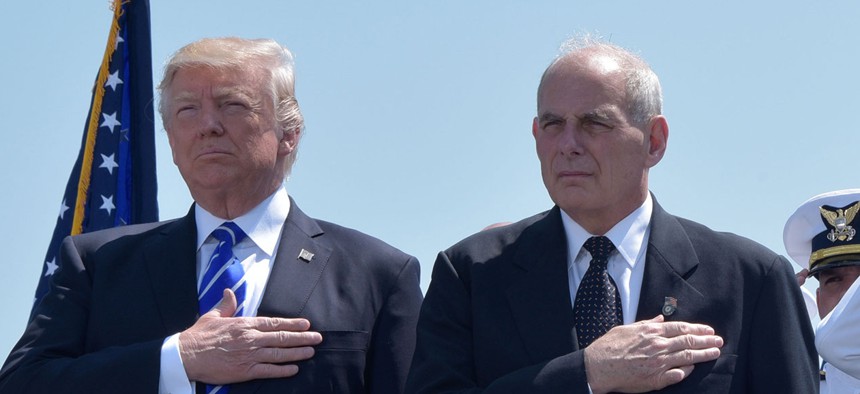
Jetta Disco/DHS
Analysis: Can Kelly Rein in the Unruly President?
Maybe so, but it may make Trump turn on him—and a bigger question is whether it really matters at this point.
One of the more interesting political questions these days is whether Gen. John Kelly can bring some semblance of order to the Trump White House. If anyone can transform the most disorganized and confused White House in modern history into something resembling a functional Office of the President of the United States, it might be a retired four-star Marine general. President Trump seems to respect only high-ranking generals and people who have been as successful or more successful than he’s been in the business world, and for now he’s giving Kelly more latitude than outgoing Chief of Staff Reince Priebus ever dreamed of.
It can be argued that given the level of dysfunction at the White House, any improvement would be immediately obvious. But then again, the chaos flows from the top down. President Trump is not someone who values order and reflection, rigorous fact-gathering, and analytical decision-making, so any structure that is imposed is more cosmetic than real.
So far, Kelly’s moves have been impressive. Before he arrived, friends, family, and advisers meandered into the Oval Office, seemingly at will. Meetings dragged on endlessly and often with little direction. Paper reached the president’s desk from every direction. Some of the memos were inaccurate and few warranted a president’s attention. In short, the place was a mess, and under Kelly it seems to have gotten somewhat better. Heading into the August lull, this is a natural reset point, and it couldn’t have come too soon.
One thing that could help Kelly is Attorney General Jeff Sessions’s announced crackdown on leaks. Now don’t get me wrong: I’m a journalist, and I thrive on getting inside information and insights. Leaks can play an important role in informing the public on what the government is really up to. The Pentagon Papers, for example, opened a window into what was going wrong in Vietnam and played a pivotal role in changing how Americans viewed the war. But a lot of the leaking in this administration has been sophomoric towel-snapping designed to subvert rivals or curry favor with journalists. The effect is to make the entire operation and everyone in it look bad. Some of the leaks were aimed at embarrassing the president, who after all is their boss. The blatant disloyalty of many of the leakers really makes you wonder what makes them tick. My question is, if you don’t like, respect, and support the guy you’re working for, why not resign and do work that you consider important and honorable?
Some analysts have noted that it’s one thing for the White House chief of staff to manage down, but quite another to manage up, especially when your boss is a 71-year-old man with deeply ingrained traits. But in Kelly’s early days, the president’s more unhelpful tweets have become more infrequent, and if he’s had any outbursts they have remained behind closed doors and not made public. The trouble is, if Kelly is given credit for reining in the boss, Trump may resent being treated like a child and may turn on his minder.
An important question is how running a tighter ship in the White House matters at this point. Obviously we are only at Day 200 of a presidency that will last 1,460 days, but Trump’s disapproval ratings seem locked in at the high 50’s, his approval ratings are stubbornly stuck around 39 or 40 percent, and the Republican Party in Congress is both badly divided and held back by narrow majorities and so far has no major legislative accomplishments. The Washington Post’s Paul Kane pointed out last week that the Senate has passed fewer than 10 bills this year that required roll-call votes. Raising the debt limit and passing a budget before Oct. 1 are likely to move to center stage when Congress returns next month, putting an even greater squeeze on the next big goals of tax reform and a major infrastructure program.
In terms of things that can be done unilaterally by the administration, through executive orders or decisions made at the Cabinet department, agency, or commission level, the Trump administration is making a strong impact on policy and achieving many of its goals, particularly in terms of rolling back many Obama administration policies and rules, most specifically in the area of the environment and increasingly on the labor-relations side as well.
From the standpoint of Congress, a president should want to be some combination of loved and feared, but at the very least respected. It doesn’t take too many conversations with people on Capitol Hill to find that this President is a big zero on big issues despite his congressional majority, but all but a handful of Republicans have to be a bit more circumspect with their views because 80-plus percent of Republican voters approve of the job that Trump is doing and 90-plus percent of Trump voters say they would vote for him again.
Even if the White House suddenly and miraculously becomes a well-oiled and highly functioning machine, this administration still faces formidable challenges. But at the very least, the perception that incompetence, backbiting, and infighting takes precedence over policy making, really undercuts any chance to be effective.
NEXT STORY: Play of the Day: Trump's Working Vacation






